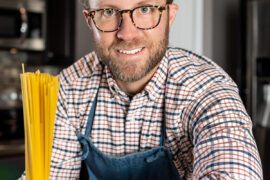Nadiya Copeland Fights for the Forgotten in Her Homeland
It’s a war no one believed would happen, especially those who lived and have since fled the war-torn country of Ukraine.
“We were able to bring my parents to the United States just two days before the beginning of the war,” said Nadiya Copeland of the Ukrainian town Veselinovo in the Mykolaiv region. The photographer and wellness coach moved to the states 18 years ago and lives in Pass Christian with her husband and two teenage daughters, the youngest of whom is on the autism spectrum.
“They didn’t want to come,” Copeland said of her mother and father. “No one believed Russia would invade. We live in a century where war just doesn’t seem possible. And now Ukraine is fighting for the whole world. If it loses, we are looking at World War III with the most destructive weapons in human history. We all need to do what we can to help them.”
Her parents, Nadia and Sergii Myrnenko, even made arguments to stay in their beloved country and sighted the invasion predictions were only media hype and American propaganda. The Ukrainians were being told by both their government and the Russian regime that the soldiers and military equipment being sent from Russia to the Ukrainian border were only there for training exercises. The Ukrainian people were told every day not to worry, and unfortunately, many believed it.
Copeland didn’t.
She lived in constant fear for her family members still in Ukraine and she saw those suspicions come true when the invasion did happen on February 24, 2022, and Russian forces attacked the Ukrainian capital, Kyiv, and the country’s second-largest city, Kharkiv, in an attempt to overthrow President Volodymyr Zelensky’s government. More than a year has now passed since the invasion, and Copeland feels for the first time in her country’s history, Ukraine has its own identity and it’s being seen by the world as separate from Russia.
But, she still has reservations as her brother, Dmitro Myrnenko, remains in Ukraine.
He’s not a soldier trading punches with the Russian military, but he is on a different kind of frontline in Kyiv as a banker. Myrnenko stayed behind along with his girlfriend and several friends to make sure his people had the means to escape or the funds they need for day-to-day necessities.
And it’s a struggle. Some days the functioning banking systems are smooth and other days employees must scramble for necessities such as electricity and constantly listen for siren alerts about incoming rockets or missiles. Ukrainians continue to demonstrate an unparalleled ability to withstand the enemy but also to adapt to a new environment. These frontline bankers are developing solutions to support a banking network, even in blackout conditions, with backup electricity and sporadic connectivity. Nothing comparable has ever been implemented anywhere in the world.
“These are the things no one is talking about,” she said, adding she is incredibly proud of her brother and speaks to him as often as possible.
“He tries to find something good to say,” Copeland said. “He tells me he doesn’t want to always complain to me about the bad and he needs to talk about the good.”
Copeland called Myrnenko at 2 a.m. Ukrainian time the day the invasion began and woke him up. He didn’t realize Russian troops had invaded and was even hesitant to believe the words coming through his cell phone. And then a missile flew by a window of his multilevel apartment.
“We were both so scared, but we knew at that moment Ukraine would unite in a way no one was expecting,” she said, choking back tears.
And as exasperated as Copeland is over the invasion, she’s also sympathetic to her Russian friends, most of which are former college classmates with limited internet and cell phone services. Anytime she does reach a Russian friend, they don’t believe Ukraine is war-torn and try to convince her that news reports are fabricated by the American government.
“It’s like they are brainwashed,” she said. “They just can’t get on the same page right now.”
Despite their negative claims, Copeland continues to reach out and moves forward daily with a group of volunteers she gathered to send lifesaving supplies to Ukraine. Bishop Vitaliy Kryvytskyi of the Diocese of Kyiv-Zhytomyr visited the Gulf Coast in February and attended a holy mass at Our Lady of the Gulf Catholic Church in Bay St. Louis. Afterward, Copeland hosted a dinner with Ukrainian families, volunteers, and the bishop.
“He came here to personally thank people from the Gulf Coast who raised and donated most of the funds,” she said. “He recognized that the people who experienced losing everything in Hurricane Katrina are always the first ones to help in a crisis and we will continue to do so until the war ends.”
Meeting the bishop was especially helpful to her parents, who have been experiencing survivor’s guilt. Even now Copeland’s mother watches news reports and asks, why did this happen? Copeland hugs her and tells her there is no answer and that all they can do is rebuild Ukraine when it’s finally over.
Reach out to Nadiya Copeland at nadiyacopeland@gmail.com to see how you can donate relief for Ukraine.





